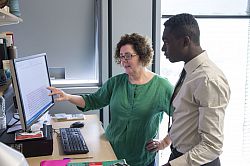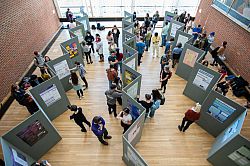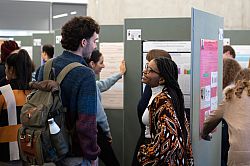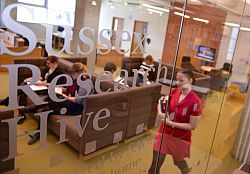The JRA Journey
Stage 1: The Summer Research Project
 Junior Research Associates (JRAs) undertake an intensive eight-week, full-time research project, which usually takes place in their second summer of study. Each student receives comprehensive training, to ensure they have the skills needed to carry out high-level research, as well as receiving support from an academic supervisor and postgraduate mentor throughout their project. We want all undergraduates to have an equal chance of undertaking a JRA project, so we also provide bursaries to help our students study full time over the summer.
Junior Research Associates (JRAs) undertake an intensive eight-week, full-time research project, which usually takes place in their second summer of study. Each student receives comprehensive training, to ensure they have the skills needed to carry out high-level research, as well as receiving support from an academic supervisor and postgraduate mentor throughout their project. We want all undergraduates to have an equal chance of undertaking a JRA project, so we also provide bursaries to help our students study full time over the summer.
 Stage 2: The Poster Exhibition
Stage 2: The Poster Exhibition
Once their research project is completed, each JRA designs an academic poster which presents their research journey and summarises their findings. This poster is then displayed in our annual Poster Exhibition in October. During the exhibition, the students are awarded with official Junior Research Associate certificates as the completion of their research projects and the 1st, 2nd and People’s Choice awards are announced.
Stage 3: Presenting at BCUR
 Each year one university hosts the British conference for Undergraduate Research (BCUR), which aims to bring together undergraduates from across the country to present their research and share their experiences. All JRAs are eligible for this conference and, if they wish to attend, students can choose to either present their poster or give an oral presentation. All students who attend BCUR will be supported by our team throughout the application stage and whilst attending the event.
Each year one university hosts the British conference for Undergraduate Research (BCUR), which aims to bring together undergraduates from across the country to present their research and share their experiences. All JRAs are eligible for this conference and, if they wish to attend, students can choose to either present their poster or give an oral presentation. All students who attend BCUR will be supported by our team throughout the application stage and whilst attending the event.
 Taking Your Research Furthur...
Taking Your Research Furthur...
For many of our undergraduates, the legacy of their research project extends well beyond their original eight weeks as a JRA. Several students continue to develop the ideas they formed as a JRA in the final years of their undergraduate degree, and often into their postgraduate degrees. Many forge lasting relationships with their academic supervisors, and therefore some subsequently choose to undertake PhDs, working alongside their former JRA supervisors. As a result, several projects have been developed and expanded, eventually emerging as academic papers or PhD theses or book chapters, and many JRA projects have been presented at academic conferences.


